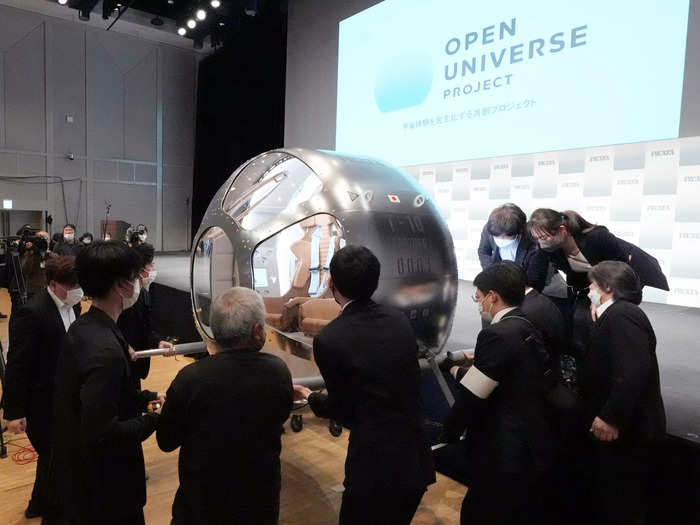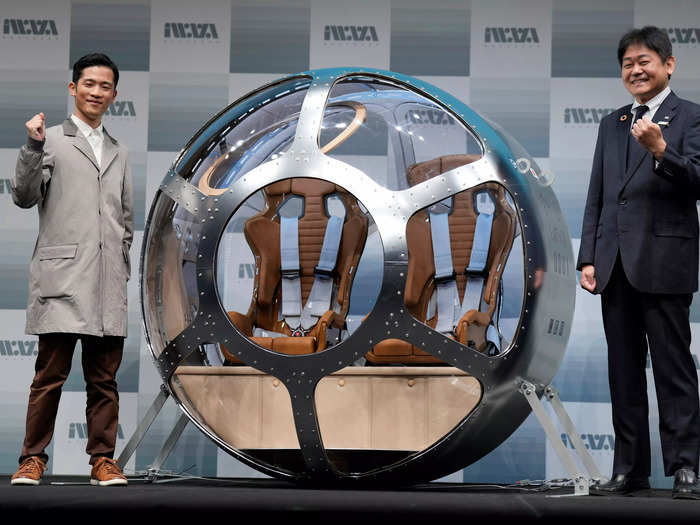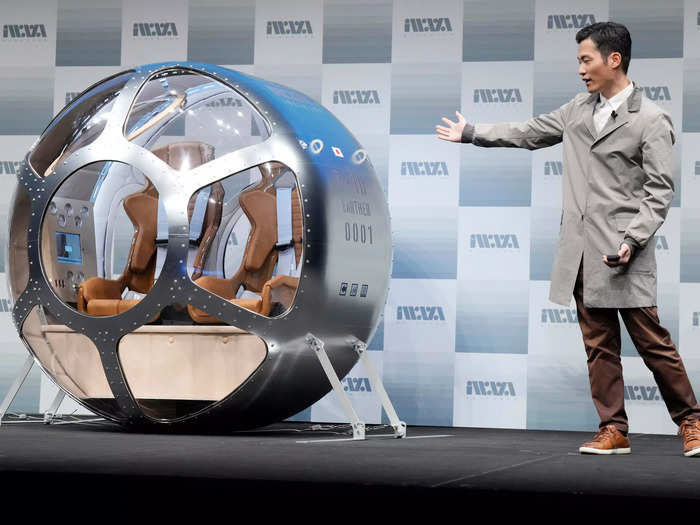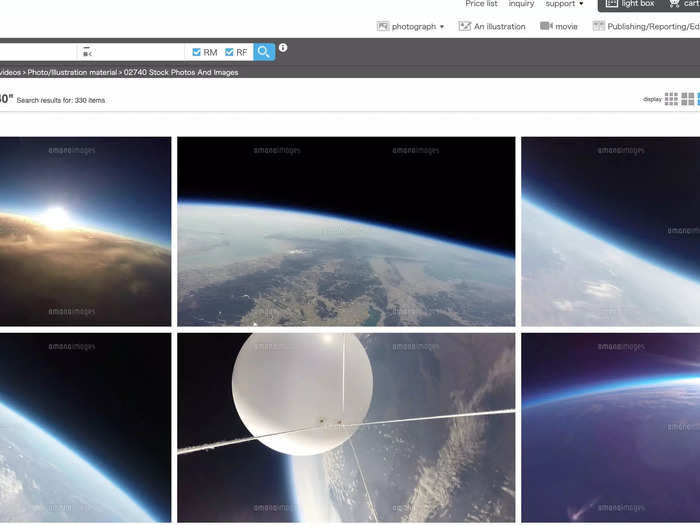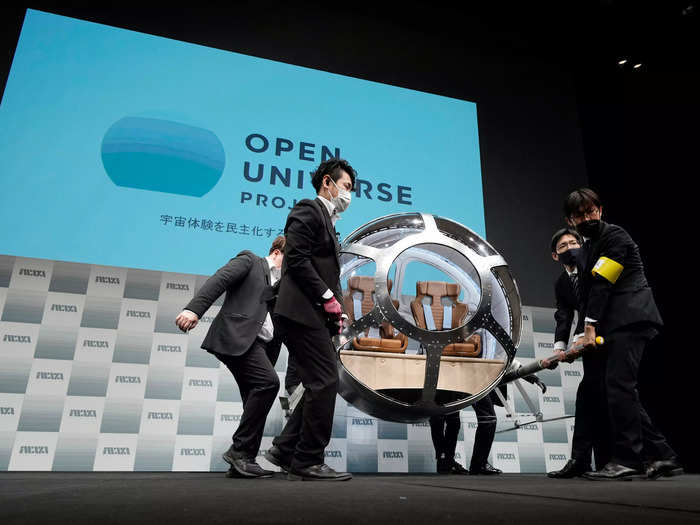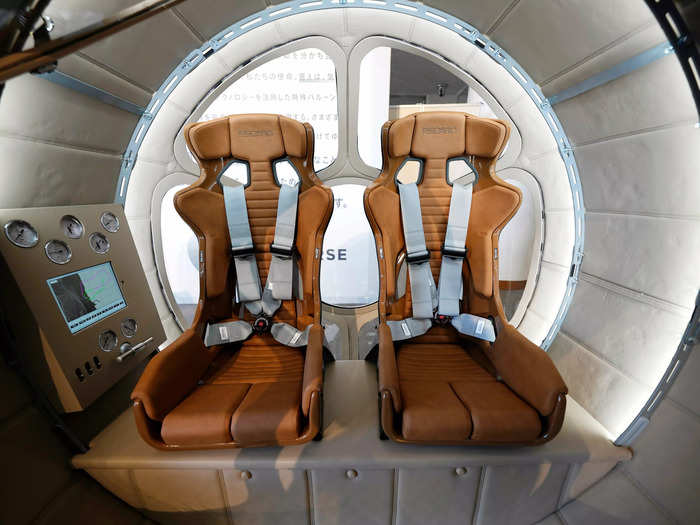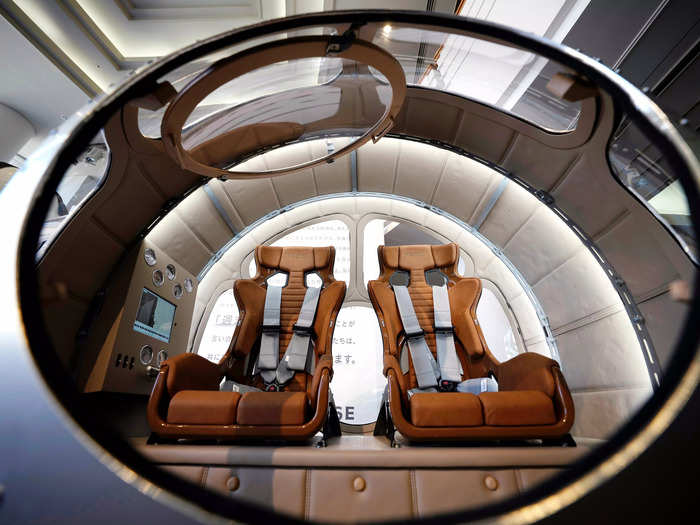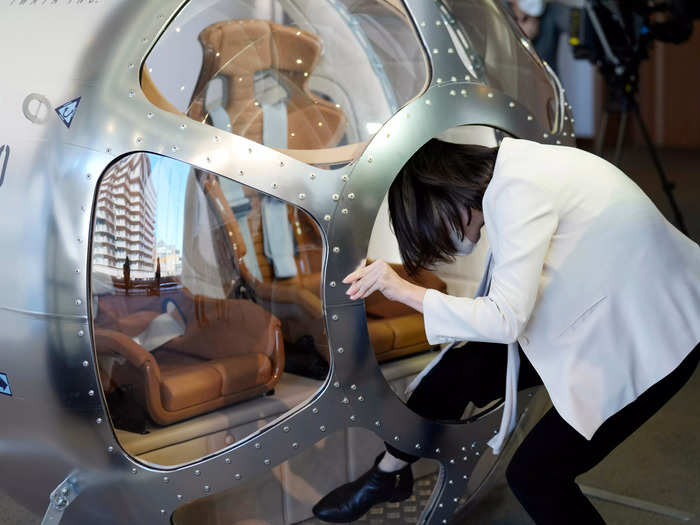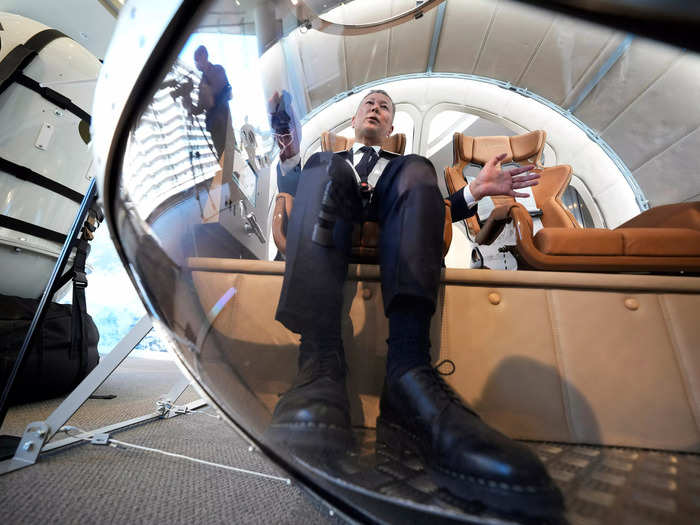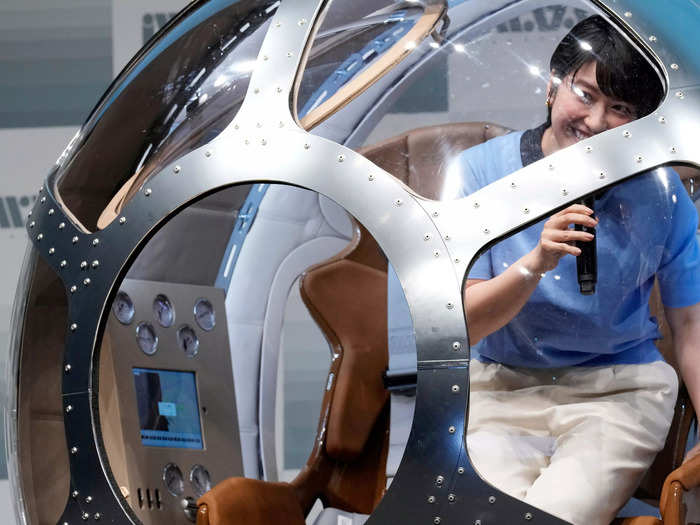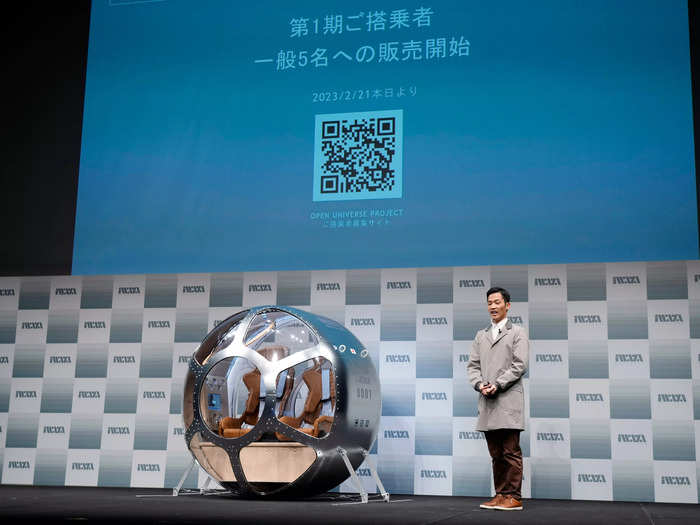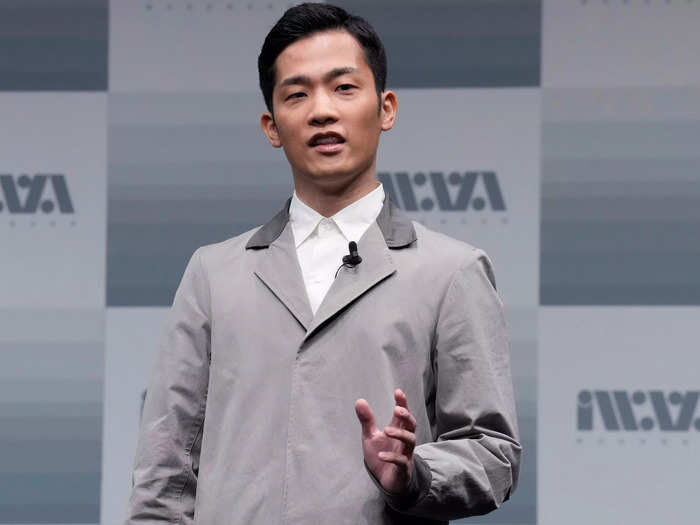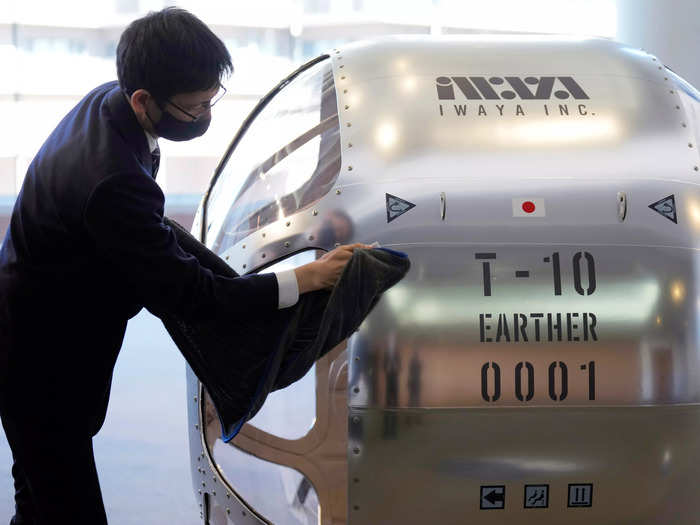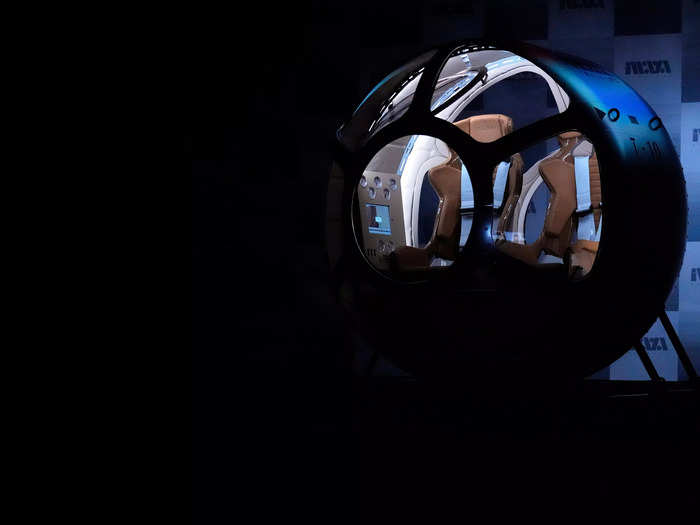CEO of Iwaya Giken Keisuke Iwaya (left) with senior managing executive officer Takayuki Hanasaka.AP Photo/Eugene Hoshiko
- Iwaya Giken, a Japanese startup, unveiled its commercial spacecraft expected to launch this year.
- It claims the capsule can rise up to 15 miles in the sky with a helium balloon, offering views of space and earth.
Going to space may eventually be a viable experience even if you're not a millionaire or billionaire thanks to a Japanese startup.
Staffers at a Japanese startup carry a prototype of its spacecraft on stage during a press conference. AP Photo/Eugene Hoshiko
Iwaya Giken, a space tech startup based in Sapporo, unveiled this week its plans to launch its helium space-viewing balloon.
CEO of Iwaya Giken Keisuke Iwaya (left) with senior managing executive officer Takayuki Hanasaka. AP Photo/Eugene Hoshiko
Keisuke Iwaya, the CEO of Iwaya Giken, said he has "loved science and space" since he was a kid and was inspired by Dr. Emmet Brown from "Back to the Future."
CEO Iwaya unveiling his company's spacecraft. AP Photo/Eugene Hoshiko
As a college engineering student, Iwaya developed and successfully launched balloons with cameras attached to them, capturing photos of the earth from 18 miles above. Since then, he has conducted at least 80 similar launches and has licensed space photography for businesses.
A screenshot of some of Iwatani's space photos for sale. Amana Images
Iwaya now wants to take space exploration to the next level. He said his goal is to make commercial space travel — which could be worth millions of dollars — more accessible. Japanese space programs have lagged behind American ones like SpaceX and Blue Origin.
Iwaya Giken employees carrying the aircraft on stage during the unveiling. AP Photo/Eugene Hoshiko
The spacecraft — a work-in-progress since 2012 — includes a 4.9-foot wide airtight cabin with two seats: one for the pilot and the other for a passenger. It is lifted by a helium-powered balloon that the company says can rise up to 15 miles into the sky, which is the middle of the stratosphere.
The 4.9-foot wide spacecraft includes a two-seater cabin. AP Photo/Eugene Hoshiko
At that altitude — higher than a jet plane can fly — passengers will be able to see the curve of the earth with nothing blocking the view.
Passengers of the spacecraft can see the curve of the earth. AP Photo/Eugene Hoshiko
The cabin includes multiple large windows for passengers to observe space from above and earth from below. Built with plastic, the cabin will be resistant to temperature and air pressure changes.
A journalist stepping into spacecraft. AP Photo/Eugene Hoshiko
Taking off from a balloon port in Hokkaido, the spacecraft will ascend for two hours, hover above the earth for another hour, and complete its hour-long descent back to earth.
Raita Naka, head of public relations for a Japanese startup company, sitting in the spacecraft. AP Photo/Eugene Hoshiko
The helium used to lift the spacecraft will be reusable, the company said. The spacecraft is restricted to flying over Japanese land and airspace.
Japanese actress Arisa Kuroda inside the cabin. AP Photo/Eugene Hoshiko
As part of his plan to "democratize space," CEO Iwaya said riders don't need billions in their bank account to fly. Extensive training and technical language skills also aren't required, he said.
CEO Keisuke Iwaya unveiled the helium spacecraft on stage during a press conference. AP Photo/Eugene Hoshiko
"It's safe, economical and gentle for people," Iwaya said. "The idea is to make space tourism for everyone."
Keisuke Iwaya, CEO of Iwaya Giken. AP Photo/Eugene Hoshiko
When the spacecraft is launched later this year, a flight will cost roughly $180,000, though it will eventually be reduced to tens of thousands of dollars, Iwaya said.
A Iwaya Giken employee cleaning the spacecraft. AP Photo/Eugene Hoshiko
Interested riders have until the end of August to apply to fly in the spacecraft. The initial five passengers will be announced in October, each flight a week apart from one other if the weather permits.
A prototype of the spacecraft in the dark. AP Photo/Eugene Hoshiko

